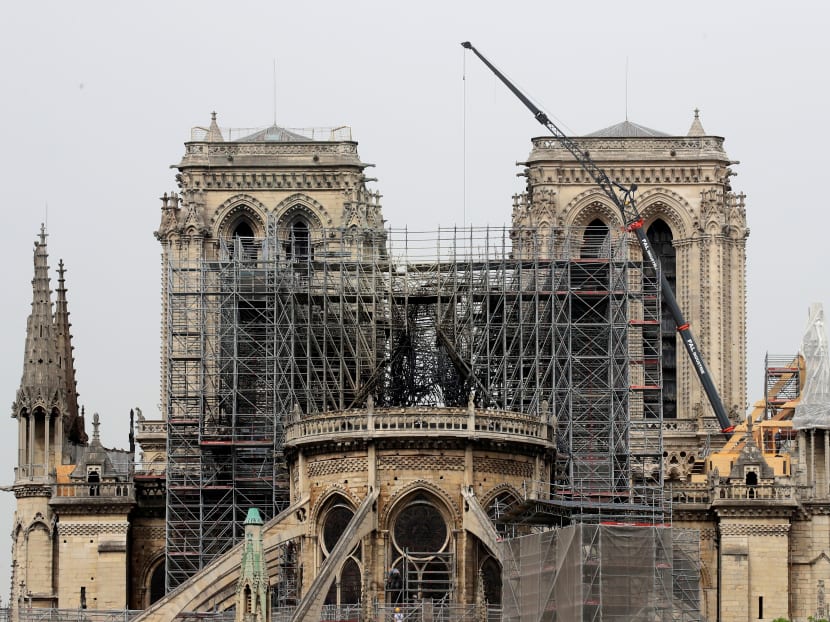Critics of donations to rebuild Notre-Dame are barking up the wrong tree
The fire that gutted the Notre-Dame cathedral in Paris made headlines across the world.

Critics accused donors who contributed money to the rebuilding of Notre-Dame of not donating to more worthy humanitarian causes.
The fire that gutted the Notre-Dame cathedral in Paris made headlines across the world.
Shortly after the cathedral’s main spire tumbled down, wealthy French billionaire philanthropists and corporations pledged donations to help restore the historic 856-year-old monument.
This philanthropy however has been met with cynicism. Critics accuse these donors of not donating to more worthy humanitarian causes, such as tackling poverty, particularly given how economic hardship has prompted thousands of yellow-vest rioters in France to rally against the Government for weeks.
While the view of these critics stems from good intentions, it is nonetheless misguided.
First, it is not appropriate to compare Notre-Dame-related philanthropy to a complex issue like poverty. With the media spotlight on the cathedral at the moment, it is obvious to see that there is much social capital to reap from making a public display of generosity.
While there is no evidence to suggest that the philanthropists were solely inspired to generate good publicity for themselves, it is clear that there are a very different set of incentives involved in funding poverty relief.
Read also
Furthermore, even if all the pledged funds to the Notre-Dame restoration efforts right now were directed to the humanitarian organisations, poverty will still persist.
Second, and more importantly, implicit in the line of criticism we see targeted at the wealthy philanthropists is the notion that poverty is a simple matter of a low accounting balance that can be solved by fund transfers.
Just like a machine that does not work until the right cog is inserted, the problem is seen as a matter of “inputs” where poverty can be eradicated simply by funnelling enough of the “right capital” into it.
This view is mistaken because it treats poverty as a problem where the solitary goal is to make the poor richer.
Yet, as sociologists and anthropologists have long emphasised, poverty is not a simple matter of insufficient wealth and nutrition.
In fact, poverty is a multidimensional problem that has to deal with underlying sociocultural norms, problems of social isolation, physical and mental health, and the types of rules and incentives put in place by public policies that contribute to and exacerbate conditions of poverty.
Read also
Take for example the continent of Africa. More than US$4.6 trillion in aid has been channelled into the developing continent in the last five decades, supported by intergovernmental organisations like the United Nations and World Bank. Yet experts have largely deemed these efforts ineffective and a failure in uplifting people out of poverty.
Why? For one, because the rules of governance were established by corrupt political leadership. These are systems of rampant bribery that allowed and even incentivised abuses of power. Without understanding how the rules function, all the humanitarian funding in the world from well-meaning do-gooders to tackle poverty is likely to come up short.
In other words, the answer to poverty is not as simple as capital transfers, foreign aid packages or wealth redistribution from the so-called 1 per cent to the 99 per cent. This is what critics of the Notre-Dame cathedral philanthropists and many proponents of welfare redistribution fail to grasp.
Poverty alleviation is a coordination problem which requires us to deal with tradeoffs in a world of economic scarcity, and understanding the formal (legislation) and informal (culture) rules that govern the economic activities of an impoverished society.
This is also why the best forms of welfare help are ones that are decentralised, because people at the grassroots level often understand the contextual nuances of poverty far better than those in a far-away centralised bureaucracy.
This can be seen in Singapore’s self-help community groups where key decisions involving allocation of welfare to the low-income are left to community group leaders familiar with the aforementioned multiple dimensions of poverty.
Read also
But on a macro scale, policies that truly create wealth and eliminate poverty are those that harness the human inclination toward self-serving behaviour to promote the public interest.
Adam Smith observed this simple yet unintuitive wisdom in free market competition that was conveyed by his famous “invisible hand” analogy. Yet Smith is not saying that unbridled selfishness is always good, as his critics often misinterpret him for.
The invisible hand works only when the right institutions that incentivise proper economic activity are in place: robust property rights, rule of law, the freedom to contract and a tax code that does not overly-penalise investment and growth.
Taken together, the best way to tackle poverty is to focus on economic growth, which is best achieved when such market institutions as Smith pointed out are in place.
This is in fact the approach that Singapore and the three other Asian tigers – Taiwan, South Korea and Hong Kong – have taken since the 1950s. In more recent history, economists have marveled at how market reforms eliminated poverty on a more apocalyptic scale than any welfare state programme ever enacted in China post-1979, Chile post-1983 and India post-1991. This is a cause to celebrate capitalism, not condemn it.
Through free markets and economic freedom, nations have enjoyed strong growth.
In 1820, more than 90 per cent of the world population lived in extreme poverty. By 2015, less than 10 per cent of humanity did so.
We must not be seduced by easy redistribution narratives like the critics of the Notre-Dame philanthropists call for. Poverty alleviation is a complex issue that is embedded in different social and political rules.
Treating it as a just another problem with a lack of capital inputs ultimately fails to address what is morally troubling about poverty.
ABOUT THE AUTHOR:
Donovan Choy is a policy analyst with the Adam Smith Centre Singapore, a think-tank promoting pro-market principles.









